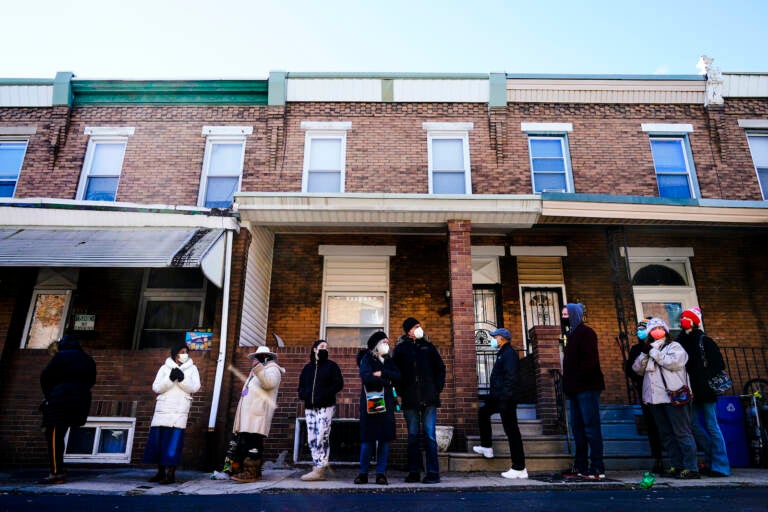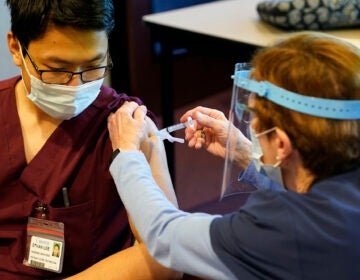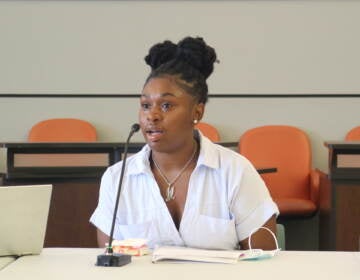COVID cases are climbing, but region’s hospitals say the load isn’t overwhelming — at least not yet
An informal survey of the region’s health systems indicates this newest wave of virus cases hasn’t knocked them off their feet — at least not yet.

City residents wait in a line extending around the block to receive free at-home rapid COVID-19 test kits in Philadelphia, Monday, Dec. 20, 2021. (AP Photo/Matt Rourke)
Ask us about COVID-19: What questions do you have about the coronavirus and vaccines?
It was less than a month ago that a man in his 30s from Northwest Philadelphia tested positive for the omicron variant of the coronavirus — the first reported case in Philadelphia. Now, the more transmissible omicron, on the heels of the still-formidable delta variant, is piling on fuel and COVID-19 case counts are climbing.
Some school systems are weighing a return to remote learning, the National Hockey League is putting a pause on its season, and testing clinics are experiencing long lines eerily reminiscent of the pandemic at its peak.
Last year’s holiday season brought record-high coronavirus case numbers and subsequently bombarded hospitals with more patients than they could handle. An informal survey of health systems indicates that this newest wave hasn’t knocked them off their feet — at least not yet.
“I think, overall, we are seeing an increase in the total number of cases at all of our hospitals, compared to earlier, even in just earlier December, and definitely in October and November. So the total case counts have definitely gone up. Compared to last year though, we are definitely lower in terms of the total number of patients that are hospitalized with COVID,” said Dr. Eric Sachinwalla, medical director for infection prevention at Einstein Healthcare Network.
Sachinwalla said that the five-hospital system is fortunate to be an area that is heavily vaccinated. He hopes that with a sustained push for more vaccinations, the region can avoid last year’s devastating holiday season wave.
But he thinks the “million dollar question” about the vaccines’ effectiveness against the omicron and delta variants needs further evaluation.
“I think there’s a fair amount that we still don’t know. I think the general expectation is that we will continue to see increases in total hospitalizations. However, at least the preliminary information that we’re seeing is that the severity of illness for people who are vaccinated and who have received a booster is lower than for those that aren’t vaccinated,” Sachinwalla said.
Dr. Tony Reed, executive vice president and chief medical officer at Temple Health, said the hospital system is beginning to feel the effects of the latest rise in cases.
“We ordinarily have somewhere in the mid-500s in terms of total number of patients in the building here on Broad Street. And over the past year, we’ve had maybe about 20 patients with COVID, at any given time, possibly 30. The last number that I saw — we were in the 50 to 60 range,” Reed said.
Though the latest hospitalization numbers aren’t as concerning as last holiday season, Reed thinks it could still be too early to tell.
“I think what we’re gonna see over the next week or two is a large jump in the number of hospitalizations. And we’re already beginning to see that out in the community in terms of COVID in the city and COVID in the region, we saw that those numbers went up over the past two weeks. And I think what we’re seeing is hospitalizations are going to be about a week or two behind that,” Reed said.
WHYY News reached out to Penn Medicine about the situation at that health care network’s hospitals. In a statement, a Penn Med spokesperson said they have indeed seen a rise in the number of COVID-19 patients — specifically in undervaccinated areas.
“Most patients hospitalized with COVID-19 — about 80% — across our health system have not been vaccinated. Vaccination is highly effective at reducing COVID-19 transmission, symptoms, and hospitalizations, and it continues to be an essential strategy to protect both individuals and our communities as a whole, along with booster shots for those who are eligible,” the statement said.
Some of the hospitals contacted said they have contingency plans in place should case counts continue to spike. Einstein, for example, will consider opening up additional bed capacity.
Reed, of Temple Health, said he is not too worried about the apparent setback in the fight against the pandemic, especially with the help of vaccines to prevent severe illness. He said that the region is “falling into more of an expected pattern that follows viral transmission.”
“I am optimistic that we’re going to get through this. This is one of those things that, unfortunately, we’ve kind of gotten used to, these intermittent surges over the past two years,” Reed said. “And so, every time the positivity rate in the community goes up, and the incidence goes up, we revert back to those strategies that we know will curb the spread of infection.”
If the region wants to stomp the curve before it’s too late, now is the time for social distancing, mask wearing, and self-quarantining, Reed said.
The nurses’ perspective
Mary Adamson, an ICU nurse at Temple University Hospital and president of the Temple Nurses Association, had a slightly different take on the cyclical nature of the coronavirus pandemic. She said it’s taking a toll on staff.
“It’s defeating. How many times do you want us to do this? Why can’t we mitigate this? Why can’t we eradicate this, like we did so many other times, like we did with smallpox, like we did with … measles? Why can’t we do this? It’s very frustrating,” Adamson said.
A nurse for about 25 years, Adamson said she’s noticed a troubling trend that has only complicated matters: Some patients are pushing back against health professionals while under their care.
“The population are less and less trusting of health care. They have less respect for academia, for skill, for experience. They constantly challenge, and that didn’t used to happen,” Adamson said.
She said she is seeing what everyone else in the health system is seeing at the moment: more patients than in recent months, though not as many as last year. But she said that the hospital is “more poorly staffed” and losing nurses with each passing month, either because of pay or something more intangible.
“It’s just too much — the moral injury — what nurses are suffering, because they can’t give people what they really need, because they don’t have enough time to. There’s not enough staff available. It’s just overwhelming. And everybody’s tired and just emotionally finished,” Adamson said.
Crozer-Chester Medical Center in Delaware County reopened its COVID unit last week, so Peggy Malone, vice president of the Crozer-Chester Nurses Association, has already seen the latest rise in cases manifest itself.
Though the numbers are nowhere near last year’s spike, Malone said a change in the hospital’s strategy has overwhelmed the system.
“When … COVID first started almost two years ago now, we were given plenty of ancillary staff. Administration was pulled onto the floor to assist us. And there’s no more of that. Nurses are taking care of double and triple the COVID patients that they did, with little or no ancillary help this time around,” Malone said.
Shannan Giambrone, a nurse at Suburban Community Hospital in Montgomery County and the president of Suburban General Nurses Association, said she had a recent conversation with a fellow nurse who felt beaten down staring at another influx of patients.
Giambrone said she reassured her co-worker that the number of patients still pales in comparison to last year, but she acknowledged the validity of her colleague’s feelings.
“It feels the same, because the strain on the nursing staff is the same, but it’s not the same amount of patients in the hospital,” Giambrone said, offering a positive perspective while also calling for better staffing protocols. “And that’s why I say it’s hopeful, because while we are seeing a rise in positives again, and there’s a new strain. it seems as though these positives aren’t ending up in the hospital.”

Saturdays just got more interesting.
WHYY is your source for fact-based, in-depth journalism and information. As a nonprofit organization, we rely on financial support from readers like you. Please give today.





![CoronavirusPandemic_1024x512[1]](https://whyy.org/wp-content/uploads/2020/03/CoronavirusPandemic_1024x5121-300x150.jpg)


